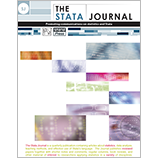Doubly robust estimation in generalized linear models
Nicola Orsini
Unit of Biostatistics and Unit of Nutritional Epidemiology
Institute of Environmental Medicine
Karolinska Institutet
Stockholm, Sweden
[email protected]
|
Rino Bellocco
Department of Statistics and Quantitative Methods
University of Milano–Bicocca
Milan, Italy
and
Department of Medical Epidemiology and Biostatistics
Karolinska Institutet
Stockholm, Sweden
[email protected]
|
Arvid Sjölander
Department of Medical Epidemiology and Biostatistics
Karolinska Institutet
Stockholm, Sweden
[email protected]
|
Abstract. A common aim of epidemiological research is to assess the association
between a particular exposure and a particular outcome, controlling for a set of additional
covariates. This is often done by using a regression model for the outcome,
conditional on exposure and covariates. A commonly used class of models is the
generalized linear models. The model parameters are typically estimated through
maximum likelihood. If the model is correct, then the maximum likelihood estimator
is consistent but may otherwise be inconsistent. Recently, a new class of
estimators known as doubly robust estimators has been proposed. These estimators
use two regression models, one for the outcome and one for the exposure, and
are consistent if either model is correct, not necessarily both. Thus doubly robust
estimators give the analyst two chances instead of only one to make valid inference.
In this article, we describe a new Stata command, drglm, that implements
the most common doubly robust estimators for generalized linear models.
View all articles by these authors:
Nicola Orsini, Rino Bellocco, Arvid Sjölander
View all articles with these keywords:
drglm, doubly robust, generalized linear model
Download citation: BibTeX RIS
Download citation and abstract: BibTeX RIS
|
